九年级上Unit1Howdoyoustudyforatest_导学案
Unit1_How_do_you_study_for_a_test教案人教新目标九年级上
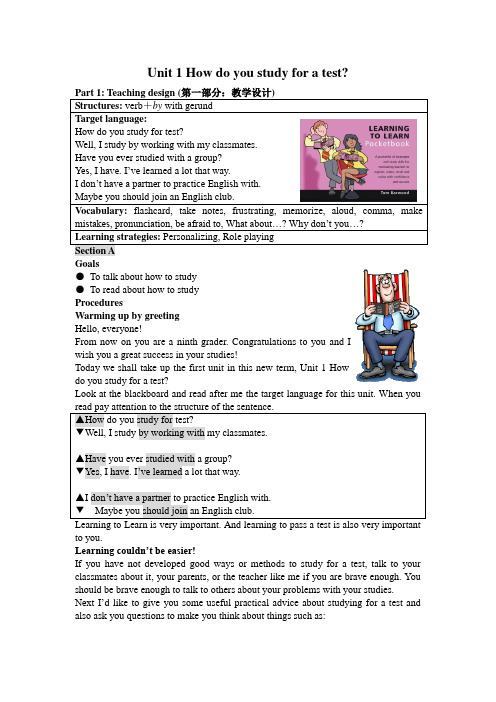
Unit 1 How do you study for a test?Part 1: Teaching design (第一部分:教学设计)Structures: verb+by with gerundTarget language:How do you study for test?Well, I study by working with my classmates.Have you ever studied with a group?Yes, I have. I’ve learned a lot that way.I don’t have a partner to practice English with.Maybe you should join an English club.Vocabulary: flashcard, take notes, frustrating, memorize, aloud, comma, make mistakes, pronunciation, be afraid to, What about…? Why don’t you…?Learning strategies: Personalizing, Role playingSection AGoals●To talk about how to study●To read about how to studyProceduresWarming up by greetingHello, everyone!From now on you are a ninth grader. Congratulations to you and Iwish you a great success in your studies!Today we shall take up the first unit in this new term, Unit 1 Howdo you study for a test?Look at the blackboard and read after me the target language for this unit. When you read pay attention to the structure of the sentence.▲How do you study for test?▼Well, I study by working with my classmates.▲Have you ever studied with a group?▼Yes, I have. I’ve learned a lot that way.▲I don’t have a partner to practice English with.▼Maybe you should join an English club.Learning to Learn is very important. And learning to pass a test is also very important to you.Learning couldn’t be easier!If you have not developed good ways or methods to study for a test, talk to your classmates about it, your parents, or the teacher like me if you are brave enough. You should be brave enough to talk to others about your problems with your studies.Next I’d like to give you some useful practical advice about studying for a test and also ask you questions to make you think about things such as:▲motivation▲how to learn your lessons in the ninth grade year▲different modes of teaching you may meet▲how to develop particular skills, such as note-taking in class1A: Checking the ways you studyI study for a test___By reading to the tape; By underlining the expressions; By reading beyondthe text; By doing used exam papers; By going over exercises books; Bycopying down the text; By learning the text by heart; By speaking with classmatesthe added ways on the blackboard.1b Listening and writingListen to understand how these people in the picture on page 2 study for a test. Write letters from the pictures. While listening, pay attention to the structures of the sentences.Section A 1b TapescriptBoy1:Hey, gang. There’s a big test on Tuesday. I really need some help. Can you tell me how you study for a big test?Voices: Sure! Yes. Sure we will.Boy1:You did really well on the last English test, didn’t you,Mei?Girl1: Yeah, I did OK.Boy1: Well, how did you study?Girl1:By making flashcards.Boy1:Maybe I’ll try that. How did you study, Pierre?Boy2: By asking the teacher for help. She was really happy I asked.Boy1:That’s interesting. How do you study, Antonio?Boy3: I like to study by listening to cassettes. But sometimes my mot her thinks I’m listening to music. And then she gets mad.Boy1:Oh, well…A: How do you study for a test?B: I study by working with a group.C: I study by listening to English.D. I study by playing games with my classmates.E. I study by doing actions such as coloring, matching.F. I study by singing English songs.G. I study by writing letters and emails.H. I study by acting out simple dialogues.I. I study by listening to and understanding stories.J. I study by writing simple sentences.K. I study by imitating from the recording.L. I study by speaking out words or phrases.M. I study by doing simple role plays.N. I study by reading and understanding simple stories.O. I study by using daily expressions.P. I study by performing short plays.Q. I study by performing simple rhymes.R. I study by writing sentences for pictures.S. I study by writing out simple poems.T. I study by reading aloud correctly.U. I study by playing text plays.V. I study by working with classmates.W. I study by going over the text before class.X. I study by copying words and expressions.Y. I study by looking and saying.Z. I study by asking others questions.2a Listening and checkingNow let’s go to page 3. Listen to the tape and check the questions you ask.While listening, pay attention to the structures of the sentences.Section A 2a, 2b TapescriptGirl1:Welcome to the English club. Today we’re going to talk about the best ways to learn English. Who has an idea?Boy1: Do you learn English by watching English-language videos?Girl2:No. It’s too hard to understand the voices.Boy1: What about keeping a diary in English? Do you learn English that way?Girl2:I think so. It helps to write English every day.Girl3: Have you ever studied with a group?Girl2:Yes, I have! I’ve learned a lot that way.Girl1: Do you ever practice conversations with a friend?Girl2:Oh, yes. It improves my speaking skills.Boy1: What about reading aloud to practice pronunciation?Girl3: I do that sometimes. I think it helps.Boy2: I do too. And I always look up new words in a dictionary.Girl3:That’s a great idea!2b Listening and matchingListen again and match each question from 2a with an answer in the box on page 3.2c Doing a pairworkNext we are going to make a conversation in pairs using the information from activities 2a and 2b.A: Have you ever studied with a group?B: Yes, I have. I’ve learned a lot that way.A: Have you ever learned English by watching videos?B:Yes, I have. I’ve learned a lot that way.A: Have you ever practiced conversations with friends?B:Yes, I have. I’ve learned a lot that way.A: Have you ever listened to tapes?B:Yes, I have. I’ve learned a lot that way.A: Have you ever read aloud to practice pronunciation?B:Yes, I have. I’ve learned a lot that way.1.Reading to the tapeWe are going to read the article on page 4. First we shall readto the tape together. That is, we start reading aloud as therecorder goes, and we stop reading aloud as the recorderstops. While reading, let’s pay enough attention to the pauses,the pronunciation and the intonation of the native reader.M ake our reading aloud as the same as the reader’s.2.Reading and dividing the article into partsNext we are going to read aloud the article slowly and clearly. We will try to divide it into thought groups.3.Reading and underliningThis week/ we asked students/ at New Star High School/ about the best ways/ to learn more English. Many said/ they learnt/ by using English. Some students had more specific suggestions. Lillian Li, for example, said/ the best way/ to learn new words/ was by reading English magazines. She said that/ memorizing the words of pop songs/ also helped/ a little. When we asked about studying grammar/ she said, “I never study grammar. It's too boring.”Wei Ming feels differently. He's been learning English/ for six years/ and really loves it. He thinks/ studying grammar /is a great way/ to learn a language. He also thinks that/ watching English movies/ isn't a bad way/ because he can watch the actors/ say the words. Sometimes, however, he finds watching movies/ frustrating/ because the people speak too quickly.Lin Chang said that/ joining the English club/ at school/ was thebest way/ to improve her English. Students get lots of practice/ andthey also have fun. She added that/ having conversations/ withfriends/ was not helpful/ at all. "We get excited/ about something/and then/ end up speaking/ in Chinese,” she said.Ways of learning EnglishNot successful OK SuccessfulLillian Li Studyinggrammar memorizing thewords of pop songsreading EnglishmagazinesWei Ming watching movies watching English studying grammarmoviesLiu Chang havingconversations/ withfriends joining the English clubSilence, please! We are going to have a role play in pairs. One of the pair is to be one Zhao: Excuse me, Li Hong. Could you help me with my English?Li: Yes, please. What’s the matter?Zhao: I have difficulty studying grammar.Li: Grammar? I never studying grammar. I study English mostly by memorizing the words of pop songs.Zhao: No grammar at all?Li:Yes, I did study grammar. But I study it by reading English magazines. I put grammar learning into reading articles. That is the best way to understand English grammar.Turn to page 4 to check √what you do to learn English in the box.Closing down by asking and answering—How did you learn English?*I listened to English them every day.**I learned many English songs by heart.*I sang the English songs to myself.*I learned every new English word in the text.*I learn English by going to English classes.*I do English homework at school.*I read English textbooks in the evening.*I speak English very slowly.**I read a lot of English sentences in the morning.*I do well in class English tests.*I get a lot of good advice on learning English from my teacher.*I discuss English problems with my classmates.*I follow the advice from my father.*I learn English sounds from the tape.*I use English-English dictionaries.*I listen to recordings and English-language TV.*I talk to native speakers every chance I got.*I read books in English, mostly novels.*I learn a lot of new words from English books.*I write more and more e-mail in English.*I use English more than my first language.*Most of my reading (websites and books) is in English.Section BGoals●To listen about learning English●To talk about learning English●To read about learning EnglishProceduresWarming up by reading to the recordingHello, everyone. To begin with, let’s listen and read to the recording of the text HOW DO YOU LEARN BEST? That is, read aloud to the tape, as fast as the tape goes, as clearly as the native reader reads. OK? Here we go!My cat speaks English.Sometimes my cat comes to me and tells me that she is hungry. Or that her leg hurts. How does my cat tell me these things? I don't speak pussy-cat language.1a Reading and checkingLearning English can be both easy and difficult. Whatthings are easy for you? And what things are difficult foryou? Now turn to page 5, read the list on the top and check√the statements that are true for you.1b Making a listYou have read and checked the statements true for you.Now think and make a list of other things difficult for you,too.I don’t know how to…!1. I don’t know how to use commas.2. I don’t know how to work with others.3. I don’t know how to make flashcards.4. I don’t know how to read the textbook.5. I don’t know how to make vocabulary lists.6. I don’t know how to listen to tape.7. I don’t know how to ask the teacher for help.8. I don’t know how to study for a test.9. I don’t know how to work with a group.10. I don’t know how to watch English videos.11. I don’t know how to practice conversations with friends.12. I don’t know how to read aloud to practice pronunciation.13. I don’t know how to learn by using English.14. I don’t know how to get more specific sug gestions.15. I don’t know how to read English magazines.16. I don’t know how to learn new words.17. I don’t know how to memorize the words.18. I don’t know how to studying grammar19. I don’t know how to watching English movies20. I don’t know how to joining the English club21. I don’t know how to improve her English22. I don’t know how to get lots of practice13. I don’t know how to ask teachers about the best ways to learn more English.2a Listening and checkingPaul is a nice boy. He works hard at his English, but still has many learning challenges. Now listen to find out what challenges he has and check them in the box on page 5.Challenges to Paul at learning English1._____ can’t get the pronunciation right.2._____ forget a lot of new words.3._____ can’t understand when people talk to me.4._____ can’t understand the words in magazines.5._____ don’t get much writing practices.2b Listening and matchingNow listen again to Paul talking about his challenges at learning English and match them with the solutions listed in the box on page 5. While listening, pay attention to the structures of the sentences.TapescriptTeacher:You look worried, Paul.Boy:I am, Ms Mitchell. I’m having trouble learning English.Teacher:You said you liked English. What’s the problem?Boy:I can’t get the pronunciation right.Teacher:Well, listening can help. Why don’t you borrow theteacher’s tapes? You can listen to them at home and repeatthe sentences that are difficult for you.Boy:That’s a good idea. But what about all the new words? I forget a lot of new words.Teacher:You can always write the new words in your notebook and study them at home. You can even study in the train on the way to school.Boy: That might really help! Thanks.Teacher:Can you understand when people talk to you?Boy:Well, no. Not always. Sometimes I just don’t understand what people are saying. Teacher:Why don’t you join an English language club to practice speaking English?The English club meets after school on Tuesdays and Thursdays.Boy:Maybe I’ll go. The only other problem I have is that I don’t get much writing practice.Teacher:Maybe you should find a pen pal.Boy: That sounds like a fun way to practice writing. Thanks, Ms Mitchell.2c Doing pairworkIN pairs we are going to role play conversations using the information from activities 2a and 2b.I don’t have a partner to practice English with. Maybe you should join an English language club.I can’t get the pronunciation right.Listening can help.I forget a lot of new words. Write the new words on cards and studythem daily.I can’t understand when people talk to me. You can join an English club to talk to people more in English.I can’t understand the words inmagazines.You can look them up in a dictionary.I don’t get much writing practices.Start writing an English diary every day.I read very slowly. You should read to the recording of thetext.I make mistakes in grammar. Why don’t study the basic sentencepatterns3a Reading and cuttingWe are going to read the text again to study the form and function ofall the predicate verbs.How I learned to learn EnglishLast year/ my English class/ was difficult/ for me. First of all, it wasn't easy/ for me/ to understand the teacher/ when she talked to the class. To begin with, she spoke/ too quickly, and I couldn't understand every word. Later on, I realized that/ it doesn't matter/ if you don’t understand/every word. Also/ I was afraid to speak/ in class, because/ I thought/ my classmates/ might laugh at me. I couldn't always make complete sentences, either. Then/ I started to watch English-language TV. It helped/ a lot. I think that/ doing lots of listening practice/ is of the secrets of becoming a good language learner. Another thing/ that I found/ very difficult/ was English grammar. So/ I decided to take lots of grammar notes/ in every class. Then/ I started to write my own original sentences/ using the grammar/(that) I was learning. It’s amazing/ how much/ this helped. Now/ I am enjoying learning English/ and I got an A/ this term. My teacher is very impressed.Now you may read the statements in the box on page 6 following the text. Write “T” or “F” beside each statement.3b Writing a letterDear Lin Feng,I know it isn’t easy to learn English, but I have some ideas that may help. You said you couldn’t understand people who talked fast. Well, you cantry to listen for the most important words, not every word. It isdifficult to understand by listening what you have not read orwhat you can’t understand well by reading. To listen well youhave to read well. So keep on reading English. Listening andreading to the recording of the text is very important, too. Everytext, after being read, should be listened to and read aloud to the tape. At first you may find it difficult to follow the reader reading aloud the text. Don’t worry. If you keep practicing you will be able to read aloud as fast as the native reader from the tape. And then you can understand people who talk fast in English.Yours,Tai Zuo4 Doing an interviewNext we shall do an interview in groups of four. Ask the three group mates about learning English. Take notes of what they say. Tomorrow you shall stand to tell the Q. What isn’t easy about learningEnglish?A. Reading is not easy.Q. What do you do about this? A. I try to cut the sentences into thoughtgroups.Q. What is your favorite way to learn more English? I read and read aloud a lot. These are the best way.Rain, rain, go away,Come again another day,Little JohnnyWants to play.Rain, rain, go to Spain,Never show your face again.SELF CHECK1.Filling in the blankWe shall make a check on our use of expressions first. Turn to page 7 and fill in each blank with the correct word given. Change the form of the word if necessary. ThenComplete the sentences Make your sentences1. You should write down new Englishwords in a vocabulary list.Don’t trust your memory. Write it down.2. If you don’t know how to spell newwords, look them up in a dictionary.I don’t know how to spell your name.3. The best way to improve your Englishis to join an English club.I’d like to join the school football tea.4. Another thing that he find very difficultwas English grammar.I find it easy to learn English.5. This kind of paper feels very soft. Do you feel cold?Turn to page 7 and write an article about Xu Zheng using the notes on Xu and his essay.As English is learned mostly through reading in China, we shall now turn to page 8 to learn to read the article entitled: How do we deal with our problem?Before reading,please go over the vocabulary list for reading on page 146. Get yourself familiarized with all the words and expressions to be found in the article.Tips for BeginnersYou are like a new babyBabies learn their language slowly.First they learn to listen.Then they learn to talk.Finally, they can read and write.Listen to English every dayListen to English radio.Watch English TV.Go to English movies.Use online lessons.Make an English/ESL friendMake up conversations.Practice dialogues.Use beginner textbooks.Read English storiesStart with children's storybooks.Try ESL readers.Read advertisements, signs and labels.Write down new wordsStart a vocabulary (new word) notebook. Write words in alphabetical order (A...B...C...). Make example sentences.Always use an English-English dictionary first. Keep an English diaryStart with one sentence.How do you feel?How is the weather?What did you do today?Write another sentence tomorrow. Visit an English speaking country Learn English more quickly. Stay with an English family. Hear native speakers talk.Have a fun experience.。
《Unit 1 How do you study for a test?》教案(3)(1)
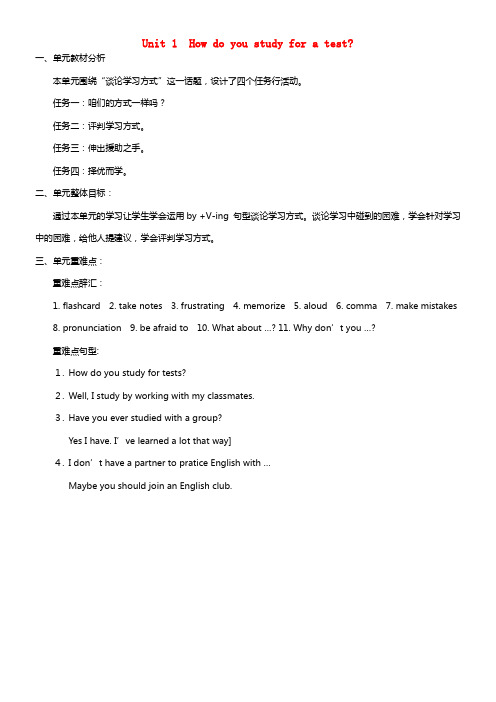
Unit 1 How do you study for a test?一、单元教材分析本单元围绕“谈论学习方式”这一话题,设计了四个任务行活动。
任务一:咱们的方式一样吗?任务二:评判学习方式。
任务三:伸出援助之手。
任务四:择优而学。
二、单元整体目标:通过本单元的学习让学生学会运用by +V-ing 句型谈论学习方式。
谈论学习中碰到的困难,学会针对学习中的困难,给他人提建议,学会评判学习方式。
三、单元重难点:重难点辞汇:1. flashcard2. take notes3. frustrating4. memorize5. aloud6. comma7. make mistakes8. pronunciation 9. be afraid to 10. What about …? 11. Why don’t you …?重难点句型:1.How do you study for tests?2.Well, I study by working with my classmates.3.Have you ever studied with a group?Yes I have. I’ve learned a lot that way]4.I don’t have a partner to pratice English with …Maybe you should join an English club.四、单元教学方式:采纳Concluding, Role playing 和Comparing 的学习策略,来展开课堂pairwork 问大师的口语交际活动和讨论活动来谈论名人所采纳的学习方式。
辞汇教学:情景操练,反复利用。
口语教学;师生互动,生生互动,对话练习,交际活动。
阅读教学:利用词典等工具书,依照上下文查寻词义。
语法教学:总结规律,仿照操练。
五、单元课时分派:本单元用四课时;第一课时―――语法和辞汇第二课时―――听说第三课时―――读写第四课时―――综合训练Unit 1 How do you study English?The first period ( grammar and vocabulary )1.知识目标:重点辞汇:flashcard, take notes, frustrating, memorize, aloud, comma, make mistakes, pronunciation, be afraid to, what about, why don’tyou…?重点句型:How do you study for tests? /Well. I study by working with my classmates.Have you ever studied with a group? /Yes, I have. I’ve learned a lot that way.I don’t have a partner to practice English with. /Maybe youshould join an English club.2.能力目标:⑴学会谈论学习方式⑵学会谈论学习中碰到的困难⑶学会针对学习中的困难,给他人提建议⑷学会评判学习方式二.教学重难点:1.重点:verb + by with gerund2.难点:运用所学知识谈论学习中的困难,并能提出相应建议。
九级英语导学案人教版UnitHowdoyoustudyforatest
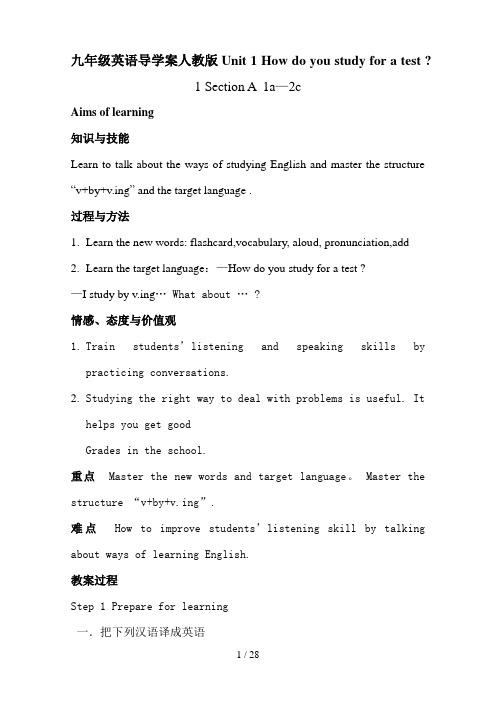
九年级英语导学案人教版Unit 1 How do you study for a test ?1 Section A 1a—2cAims of learning知识与技能Learn to talk about the ways of studying English and master the structure “v+by+v.ing” and the target language .过程与方法1.Learn the new words: flashcard,vocabulary, aloud, pronunciation,add2.Learn the target language:—How do you study for a test ?—I study by v.ing… What about … ?情感、态度与价值观1.Train students’listening and speaking skills bypracticing conversations.2.Studying the right way to deal with problems is useful. Ithelps you get goodGrades in the school.重点Master the new words and target language。
Master the structure “v+by+v.ing”.难点How to improve students’listening skill by talking about ways of learning English.教案过程Step 1 Prepare for learning一.把下列汉语译成英语1.与朋友一起学习2.阅读教科书3.列词汇表4.听磁带5.向老师求助6.太……而不能二.句型展示台7.你是怎样为考试而学习的?______ do you study _____ a test ?我是通过抽认卡来学习的。
九年级英语Unit1Howdoyoustudyforatest教案(标准版)
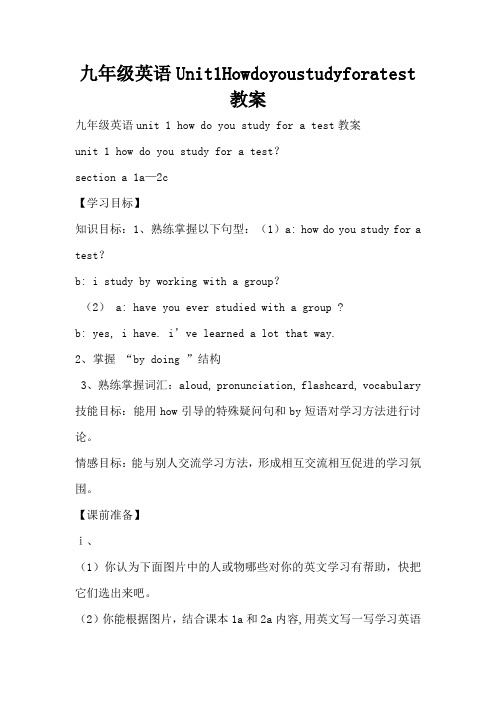
九年级英语Unit1Howdoyoustudyforatest教案九年级英语unit 1 how do you study for a test教案unit 1 how do you study for a test?section a 1a—2c【学习目标】知识目标:1、熟练掌握以下句型:(1)a: how do you study for a test?b: i study by working with a group?(2) a: have you ever studied with a group ?b: yes, i have. i’ve learned a lot that way.2、掌握“by doing ”结构3、熟练掌握词汇:aloud, pronunciation, flashcard, vocabulary 技能目标:能用how引导的特殊疑问句和by短语对学习方法进行讨论。
情感目标:能与别人交流学习方法,形成相互交流相互促进的学习氛围。
【课前准备】i、(1)你认为下面图片中的人或物哪些对你的英文学习有帮助,快把它们选出来吧。
(2)你能根据图片,结合课本1a和2a内容,用英文写一写学习英语的方法吗?(越多越好哦!)【学习过程】before listening1、对照课前准备i的内容,在班里举办一个自由访谈,向你认为英语成绩优异的同学请教一下学习方法,或者把你的经验告诉其他同学。
并由老师帮助汇总。
2、在1a中选出你认为适合自己的学习方法。
并在1a中补充你采用的其他方法。
3、观察1a中三幅图片,他们都在做什么?用英语怎么说?while listening1、听1b中孩子们谈论的学习英语的方法。
根据所听录音,将1b中的人名与1a图片中的字母匹配。
2、听两遍录音,完成下面的对话。
a: you did really well on the last english test, didn’t you, mei?c: yeah, i did ok.a: well, how did you study?c: by .a: maybe i’ll try that. how did you study, pierre?unit 1 how do you study for a test?section a 3a—4【学习目标】知识目标:1.熟练掌握以下句型:(1)lillian li, for example, said the best way to learn new words was by reading english magazines.(2)she said that memorizing the words of pop songs also helped a little.(3)sometimes, however, he finds watching movies frustrating because the people speak too quickly.(4)we get excited about something and then end up speaking in chinese.2熟练掌握词汇:differently, quickly, specific, memorize, grammar, frustrate, add技能目标:能用知识目标1中的句型对各种学习方法进行讨论,探讨最佳学习方法。
九年级英语上册 Unit 1《How do you study for a test》导学案(1) 人教新目标版
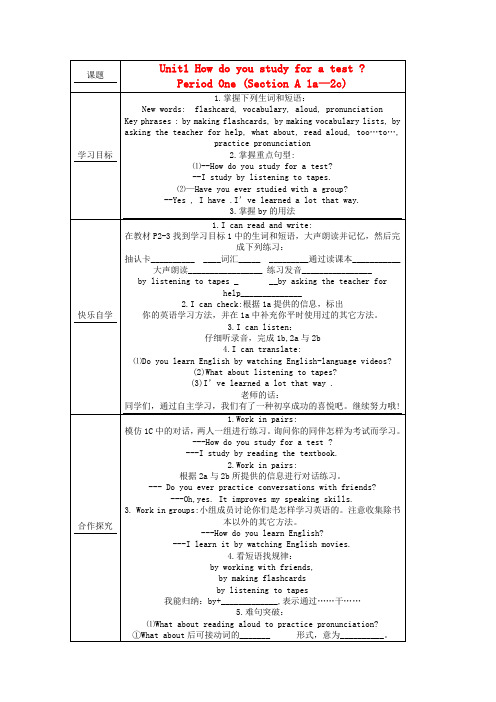
3.写出下列短语
①玩得开心________________________②加入英语俱乐部____________________
---I learn it by watching English movies.
4.看短语找规律:
by working with friends,
by making flashcards
by listening to tapes
我能归纳:by+_____________,表示通过……干……
5.难句突破:
3.掌握学好英语的几种方法.
快乐自学
1.I can read:在教材P4找到学习目标1中的生词和短语,大声朗读并理解记忆,然后完成下列练习:
memory(动词) ____________difference(副词) ____________quick (副词) ____________
keep an English notebook____________ 看英语杂志________________________
学习语法________________________结束____________
发现看电影令人沮丧 ________________________
2.I can answer:快速阅读课文3a,简要回答下列问题:
⑴Did Lillian study grammar?
⑵How long has Wei Ming been learning
④Do you usually practice ___________(play)the guitar?
⑤It’s too hard for me to __________ (understand)him
九年级英语 Uint1 How do you study for a test全单元导学案(无答案) 人教新目标版
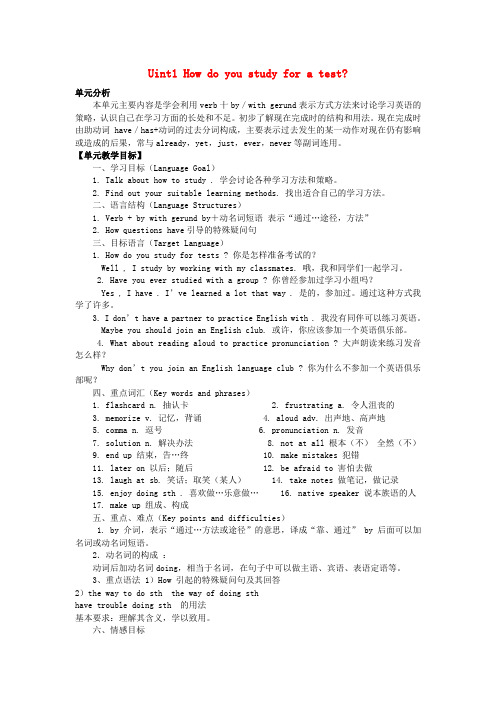
Uint1 How do you study for a test?单元分析本单元主要内容是学会利用verb十by/with gerund表示方式方法来讨论学习英语的策略,认识自己在学习方面的长处和不足。
初步了解现在完成时的结构和用法。
现在完成时由助动词have/has+动词的过去分词构成,主要表示过去发生的某一动作对现在仍有影响或造成的后果,常与already,yet,just,ever,never等副词连用。
【单元教学目标】一、学习目标(Language Goal)1. Talk about how to study . 学会讨论各种学习方法和策略。
2. Find out your suitable learning methods. 找出适合自己的学习方法。
二、语言结构(Language Structures)1. Verb + by with gerund by+动名词短语表示“通过…途径,方法”2. How questions have引导的特殊疑问句三、目标语言(Target Language)1. How do you study for tests ? 你是怎样准备考试的?Well , I study by working with my classmates. 哦,我和同学们一起学习。
2. Have you ever studied with a group ? 你曾经参加过学习小组吗?Yes , I have . I’ve learned a lot that way . 是的,参加过。
通过这种方式我学了许多。
3. I don’t have a partner to practice Engli sh with . 我没有同伴可以练习英语。
Maybe you should join an English club. 或许,你应该参加一个英语俱乐部。
4. What about reading aloud to practice pronunciation ? 大声朗读来练习发音怎么样?Why don’t you join an English language club ? 你为什么不参加一个英语俱乐部呢?四、重点词汇(Key words and phrases)1. flashcard n. 抽认卡2. frustrating a. 令人沮丧的3. memorize v. 记忆,背诵4. aloud adv. 出声地、高声地5. comma n. 逗号6. pronunciation n. 发音7. solution n. 解决办法 8. not at all 根本(不)全然(不)9. end up 结束,告…终 10. make mistakes 犯错11. later on 以后;随后 12. be afraid to 害怕去做13. laugh at sb. 笑话;取笑(某人) 14. take notes 做笔记,做记录15. enjoy doing sth . 喜欢做…乐意做… 16. native speaker 说本族语的人17. make up 组成、构成五、重点、难点(Key points and difficulties)1. by 介词,表示“通过…方法或途径”的意思,译成“靠、通过” by后面可以加名词或动名词短语。
人教版新目标九年级英语全套教案
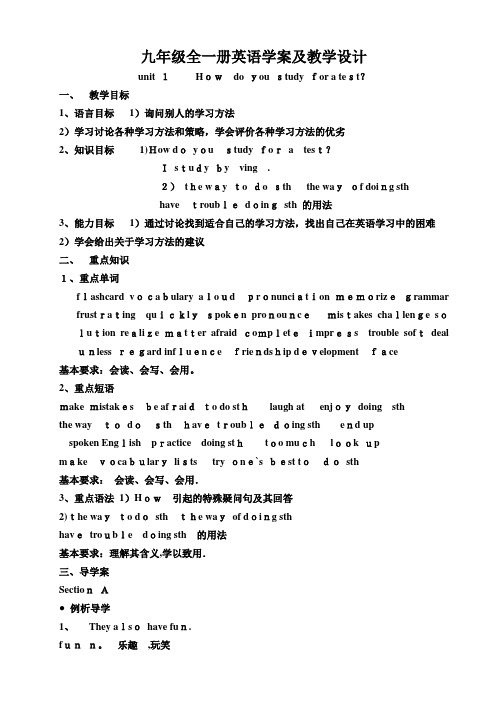
九年级全一册英语学案及教学设计unit 1Howdo you study for a test?一、教学目标1、语言目标1)询问别人的学习方法2)学习讨论各种学习方法和策略,学会评价各种学习方法的优劣2、知识目标1)How doyoustudy fora test?Istudy by ving.2)the way to do sth the wayof doing sthhavetroubledoingsth 的用法3、能力目标1)通过讨论找到适合自己的学习方法,找出自己在英语学习中的困难2)学会给出关于学习方法的建议二、重点知识1、重点单词flashcard vocabulary aloudpronunciation memorizegrammar frustrating quicklyspoken pronouncemistakes challenge solution realize matter afraid completeimpress trouble softdeal unless regard influencefriendship developmentface基本要求:会读、会写、会用。
2、重点短语make mistakes be afraidto do sthlaugh at enjoydoing sththe waytodosth havetroubledoing sth end up spoken English practice doing sthtoo much look upmakevocabularylists try one`s best todosth基本要求:会读、会写、会用.3、重点语法1)How引起的特殊疑问句及其回答2)the wayto dosth the wayof doing sthhavetrouble doing sth 的用法基本要求:理解其含义,学以致用.三、导学案SectionA● 例析导学1、They alsohave fun.funn。
九年级英语全册 Unit 1 How do you study for a test复习导学案
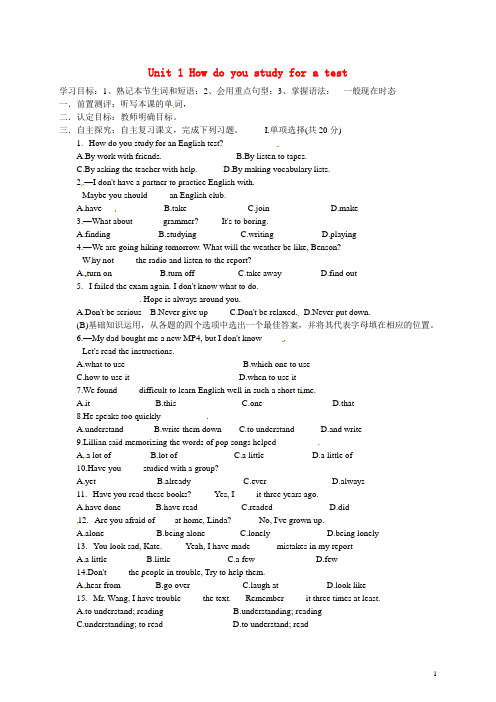
Unit 1 How do you study for a test学习目标:1、熟记本节生词和短语:2、会用重点句型:3、掌握语法:一般现在时态一.前置测评:听写本课的单词,二.认定目标:教师明确目标。
三.自主探究:自主复习课文,完成下列习题。
I.单项选择(共20分)1.--How do you study for an English test? --___________A.By work with friends.B.By listen to tapes.C.By asking the teacher with help.D.By making vocabulary lists.2.—I don't have a partner to practice English with.--Maybe you should ____ an English club.A.haveB.takeC.joinD.make3.—What about ______ grammer? --It's to boring.A.findingB.studyingC.writingD.playing4.—We are going hiking tomorrow. What will the weather be like, Benson?--W hy not ____ the radio and listen to the report?A.turn onB.turn offC.take awayD.find out5.--I failed the exam again. I don't know what to do.--_____________. Hope is always around you.A.Don't be seriousB.Never give upC.Don't be relaxed.D.Never put down.(B)基础知识运用,从各题的四个选项中选出一个最佳答案,并将其代表字母填在相应的位置。
Unit 1 How do you study for a test 全单元 教案
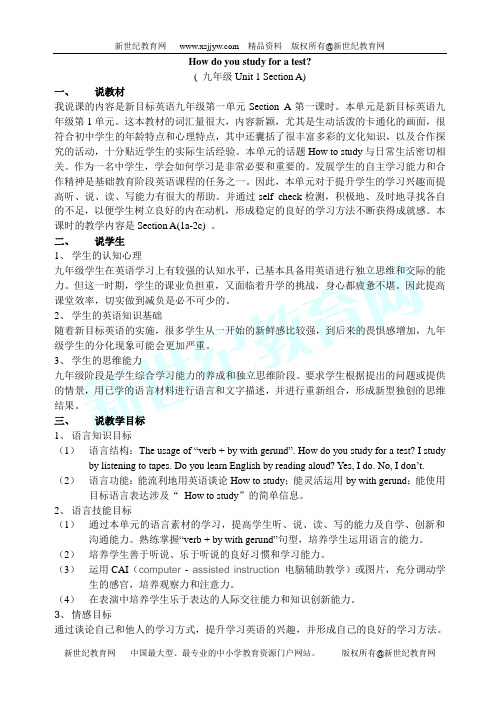
How do you study for a test?( 九年级Unit 1 Section A)一、说教材我说课的内容是新目标英语九年级第一单元Section A第一课时。
本单元是新目标英语九年级第1单元。
这本教材的词汇量很大,内容新颖,尤其是生动活泼的卡通化的画面,很符合初中学生的年龄特点和心理特点,其中还囊括了很丰富多彩的文化知识,以及合作探究的活动,十分贴近学生的实际生活经验。
本单元的话题How to study与日常生活密切相关。
作为一名中学生,学会如何学习是非常必要和重要的。
发展学生的自主学习能力和合作精神是基础教育阶段英语课程的任务之一。
因此,本单元对于提升学生的学习兴趣而提高听、说、读、写能力有很大的帮助。
并通过self check检测,积极地、及时地寻找各自的不足,以便学生树立良好的内在动机,形成稳定的良好的学习方法不断获得成就感。
本课时的教学内容是Section A(1a-2c) 。
二、说学生1、学生的认知心理九年级学生在英语学习上有较强的认知水平,已基本具备用英语进行独立思维和交际的能力。
但这一时期,学生的课业负担重,又面临着升学的挑战,身心都疲惫不堪。
因此提高课堂效率,切实做到减负是必不可少的。
2、学生的英语知识基础随着新目标英语的实施,很多学生从一开始的新鲜感比较强,到后来的畏惧感增加,九年级学生的分化现象可能会更加严重。
3、学生的思维能力九年级阶段是学生综合学习能力的养成和独立思维阶段。
要求学生根据提出的问题或提供的情景,用已学的语言材料进行语言和文字描述,并进行重新组合,形成新型独创的思维结果。
三、说教学目标1、语言知识目标(1)语言结构:The usage of “verb + by with gerund”. How do you study for a test? I study by listening to tapes. Do you learn English by reading aloud? Yes, I do. No, I don’t. (2)语言功能:能流利地用英语谈论How to study;能灵活运用by with gerund;能使用目标语言表达涉及“How to study”的简单信息。
九年级全册Unit-1---How-do-you-study-for-a-test导学案
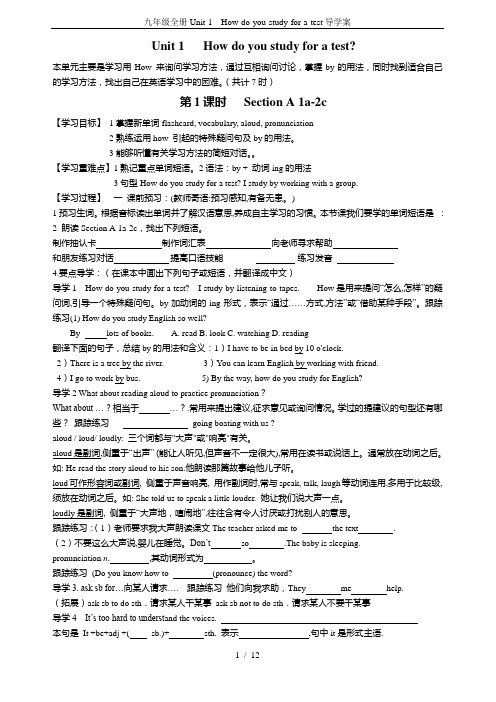
Unit 1 How do you study for a test?本单元主要是学习用How 来询问学习方法,通过互相询问讨论,掌握by的用法,同时找到适合自己的学习方法,找出自己在英语学习中的困难。
(共计7时)第1课时Section A 1a-2c【学习目标】1掌握新单词flashcard, vocabulary, aloud, pronunciation2熟练运用how 引起的特殊疑问句及by的用法。
3能够听懂有关学习方法的简短对话。
【学习重难点】1熟记重点单词短语。
2语法:by + 动词ing的用法3句型How do you study for a test? I study by working with a group.【学习过程】一课前预习:(教师寄语:预习感知,有备无患。
)1预习生词。
根据音标读出单词并了解汉语意思,养成自主学习的习惯。
本节课我们要学的单词短语是:2 朗读Section A 1a-2c,找出下列短语。
制作抽认卡制作词汇表向老师寻求帮助和朋友练习对话提高口语技能 _______ 练习发音4.要点导学:(在课本中画出下列句子或短语,并翻译成中文)导学1 How do you study for a test? I study by listening to tapes. How是用来提问“怎么,怎样”的疑问词,引导一个特殊疑问句。
by加动词的ing形式,表示“通过……方式,方法”或“借助某种手段”。
跟踪练习(1) How do you study English so well?By lots of books. A. read B. look C. watching D. reading翻译下面的句子,总结by的用法和含义:1)I have to be in bed by 10 o'clock.2)There is a tree by the river. 3)You can learn English by working with friend.4)I go to work by bus. 5) By the way, how do you study for English?导学2 What about reading aloud to practice pronunciation?What about …?相当于…?.常用来提出建议,征求意见或询问情况。
九年级英语上册Unit 1 How do you study for a test Section A学案
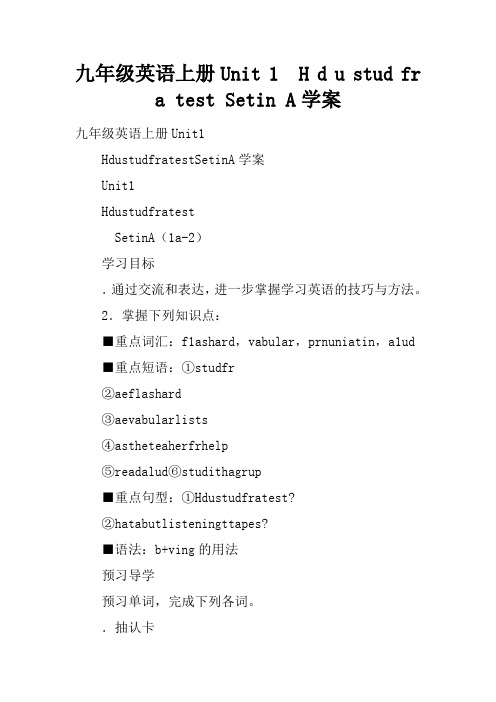
九年级英语上册Unit 1 H d u stud fra test Setin A学案九年级英语上册Unit1HdustudfratestSetinA学案Unit1HdustudfratestSetinA(1a-2)学习目标.通过交流和表达,进一步掌握学习英语的技巧与方法。
2.掌握下列知识点:■重点词汇:f1ashard,vabular,prnuniatin,a1ud■重点短语:①studfr②aeflashard③aevabularlists④astheteaherfrhelp⑤readalud⑥studithagrup■重点句型:①Hdustudfratest?②hatabutlisteningttapes?■语法:b+ving的用法预习导学预习单词,完成下列各词。
.抽认卡2.词汇3.alud(近义词)4.发音(名词).ever(反义词)6.1isten(现在分词)7.stud(过去分词)8.(如何)dustudfratest?合作研讨一、重点单词与短语.prnuniatinn.发音;发音法,其动词形式prnune【跟踪训练】(1)她认识很多法语单词,但发音不正确。
ShensaltfFrenh;rds,buttheinrretl2.Aludadv.出声地;大声地例如:readalud大声朗读【辨析】alud/lud/ludlalud出声地;大声地。
常与read,all等动词连用,lud 高声地;大声地;喧闹地。
常用于tal,spea等动词之后;ludl高声地;喧闹地。
一般可以和1ud互换,但含有“吵闹”的意思。
【跟踪训练】(2)老师要求我大声朗读文。
Theteaherasedetthetext(3)请大声点说,以便我能听清楚。
Please sthatIanhearulearl(4)不要这么大声说,婴儿在睡觉。
Dn't s Thebabissleeping3.Assbfr…向某人请求例如:Astheteaherfrhelp向老师请求帮助(拓展)assbtdsth.请求某人干某事assbnttdsth.请求某人不要干某事【跟踪训练】()他们向我求助,The e help4.tt太……而不能……【拓展】t...t可以与sthat(如此……以至于……)或Enughtd(足够……以至于……)转换。
最新-九年级英语上册 Unit 1《How do you study for a
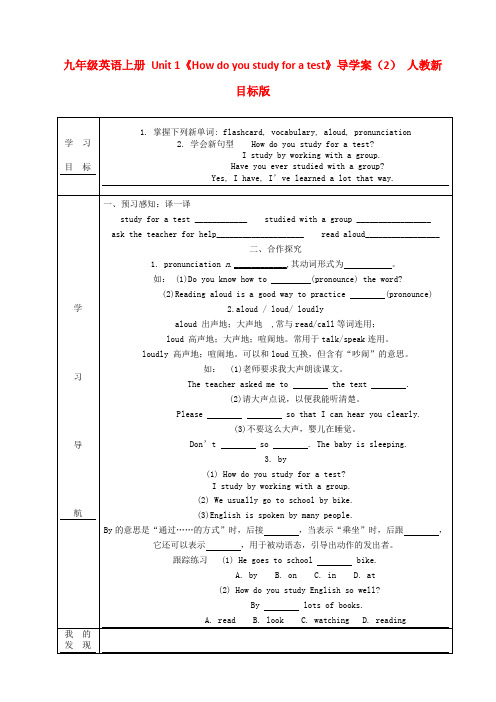
I have learned a lot_ __ _.
4、对我来说,看懂英语电视太难了
It’s_ __ _for me_ __ _English language TV.
5、记英语笔记能提高写作。
_ ___ __in English can_ _writing a lot..
6、by joining the English club at school
7、by having conversations with friends
Reasons:
A. because we can practice more and study English well.
B. because the native speakers too quickly.
九年级英语上册Unit 1《How do you study for a test》导学案(2)人教新目标版
学习
目标
1.掌握下列新单词: flashcard, vocabulary, aloud, pronunciation
2.学会新句型How do you study for a test?
I study by working with a group.
(1) How do you study for a test?
I study by working with a group.
(2) We usually go to school by bike.
(3)English is spoken by many people.
By的意思是“通过……的方式”时,后接,当表示“乘坐”时,后跟,它还可以表示,用于被动语态,引导出动作的发出者。
山东省烟台市郭城一中九年级英语《Unit 1 How do you study for a test》导学案
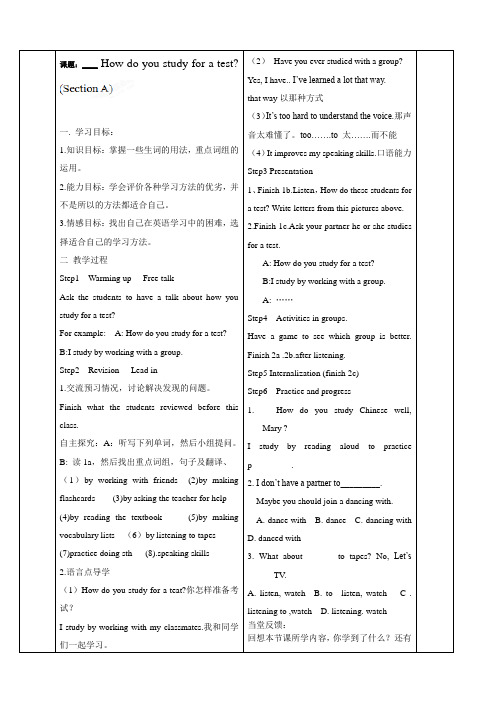
(7)practice doing sth (8).speaking skills
2.语言点导学
(1)How do you study for a teat?你怎样准备考试?
I study by working with my classmates.我和同学们一起学习。
by+doing采取什么样的手段来做,常常表示方式方法。
(2)Have you ever studied with a group?
Yes, I have.. I’ve learned a lot that way.
that way以那种方式
(3)It’s too hard to understand the voice.那声音太难懂了。too…….to太…….而不能
(4)It improves my speaking skills.口语能力
Step3 Presentation
1、Finish 1b.Listen,How do these students for a test? Write letters from this pictures above.
பைடு நூலகம்Have a game to see which group is better. Finish2a.2b.after listening.
Step5 Internalization (finish2c)
Step6 Practice and progress
1.How do you study Chinese well, Mary ?
九年级英语上册Unit 1 How do you study for a test Section A学案
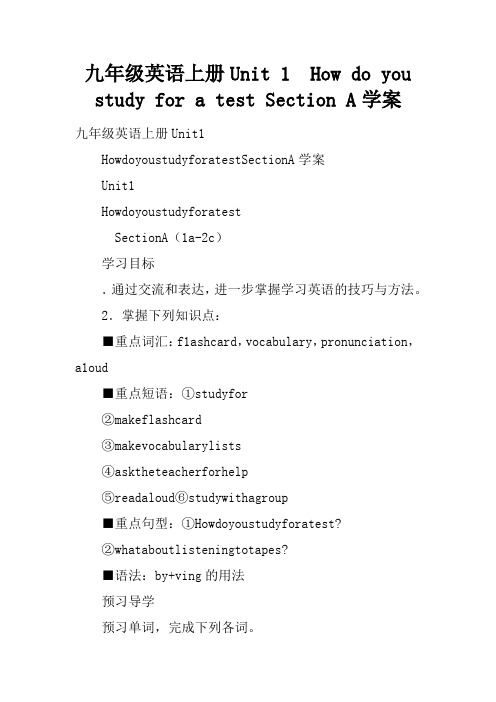
九年级英语上册Unit 1 How do you study for a test Section A学案九年级英语上册Unit1HowdoyoustudyforatestSectionA学案Unit1HowdoyoustudyforatestSectionA(1a-2c)学习目标.通过交流和表达,进一步掌握学习英语的技巧与方法。
2.掌握下列知识点:■重点词汇:f1ashcard,vocabulary,pronunciation,a1oud■重点短语:①studyfor②makeflashcard③makevocabularylists④asktheteacherforhelp⑤readaloud⑥studywithagroup■重点句型:①Howdoyoustudyforatest?②whataboutlisteningtotapes?■语法:by+ving的用法预习导学预习单词,完成下列各词。
.抽认卡2.词汇3.aloud(近义词)4.发音(名词)5.ever(反义词)6.1isten(现在分词)7.study(过去分词)8.(如何)doyoustudyforatest?合作研讨一、重点单词与短语.pronunciationn.发音;发音法,其动词形式pronounce 【跟踪训练】(1)她认识很多法语单词,但发音不正确。
SheknowsalotofFrench;words,butthemincorrectly.2.Aloudadv.出声地;大声地例如:readaloud大声朗读【辨析】aloud/loud/loudlyaloud出声地;大声地。
常与read,call等动词连用,loud高声地;大声地;喧闹地。
常用于talk,speak等动词之后;loudly高声地;喧闹地。
一般可以和1oud互换,但含有“吵闹”的意思。
【跟踪训练】(2)老师要求我大声朗读课文。
Theteacheraskedmetothetext.(3)请大声点说,以便我能听清楚。
【九年级】Unit 1 How do you study for a test教案
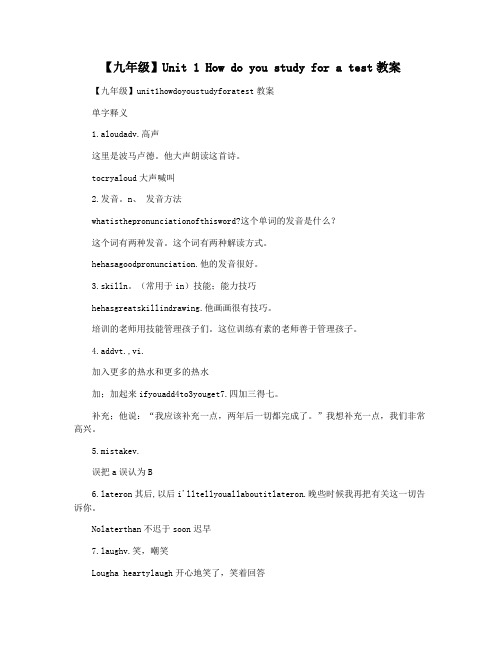
【九年级】Unit 1 How do you study for a test教案【九年级】unit1howdoyoustudyforatest教案单字释义1.aloudadv.高声这里是波马卢德。
他大声朗读这首诗。
tocryaloud大声喊叫2.发音。
n、发音方法whatisthepronunciationofthisword?这个单词的发音是什么?这个词有两种发音。
这个词有两种解读方式。
hehasagoodpronunciation.他的发音很好。
3.skilln。
(常用于in)技能;能力技巧hehasgreatskillindrawing.他画画很有技巧。
培训的老师用技能管理孩子们。
这位训练有素的老师善于管理孩子。
4.addvt.,vi.加入更多的热水和更多的热水加;加起来ifyouadd4to3youget7.四加三得七。
补充;他说:“我应该补充一点,两年后一切都完成了。
”我想补充一点,我们非常高兴。
5.mistakev.误把a误认为Bteron其后,以后i'lltellyouallaboutitlateron.晚些时候我再把有关这一切告诉你。
Nolaterthan不迟于soon迟早ughv.笑,嘲笑Lougha heartylaugh开心地笑了,笑着回答8.sentencen、宣判;惩罚:他受到了严厉的惩罚。
句子;一句话:thisisasentence.这是一个句子。
无期徒刑,无期徒刑,死刑vt.sentence-tenced,-tencing判决,宣判(与to连用)判处…刑9.秘密n.秘密,机密,奥秘,神秘thesecretofnature自然的奥秘秘密、诀窍;他成功的秘诀是什么?他成功的秘诀是什么?adj.保密的;只有少数人知道的不要违背你的计划,坚持秘密——这是秘密计划。
不要对任何人讲我们的计划,要保密,这是一个秘密计划。
10.learnv。
学习learnathingortwo学会一些东西learnbyheart记住从中学习,记住,记住learnsthbyheart背诵,熟记learntheropes摸到窍门[线索],弄清内幕 11.impressvt。
- 1、下载文档前请自行甄别文档内容的完整性,平台不提供额外的编辑、内容补充、找答案等附加服务。
- 2、"仅部分预览"的文档,不可在线预览部分如存在完整性等问题,可反馈申请退款(可完整预览的文档不适用该条件!)。
- 3、如文档侵犯您的权益,请联系客服反馈,我们会尽快为您处理(人工客服工作时间:9:00-18:30)。
Unit 1 How do you study for a test?主备人:万霞审核:吴小平张晓艳第一课时:SectionA1a-2c学习重点:by+doing ;Take about how to study for a test?一.词汇目标:1. flashcard .n 抽认卡制作抽认卡:make flashcards2. vocabulary .n 词汇-vocabularies 英语词汇:En glish vocabulary3. aloud.adv出声地,高声地指为了能使人听见而发声eg :The teacher asked him to read the article aloud .I read English ___ for about half an hour every morning. A .aloud B. loud C. loudlyloud adj.喧闹的、吵闹的adv大声地、高声地侧重发出的声音大大,传得远,一般多用来修饰speak/talk /laugh等动词(一般指谈笑方面)* loudly意为响亮地”常与ring , knock等动词连用,含有喧闹”或嘈杂”的意味。
(含有令人讨厌和被人打扰的意思)aloud强调出声”(常用在读书说话上),read aloud朗读4. pronunciation.n 发音、发音法f v. pronounce发音eg. How do you pronounce your name?5. un dersta nd f un derstood f un derstood二.词组1. ______________________________ 准备英语考试2.朗读3提高我的口语技巧________________________ 4.向某人求助 ________________________________5 =和某人练习对话_________________________ J practice+ n/代/ving 做宾语[和某人对话_ ________ j practice doi ng sth三.重点句子-1. -How do you study for an English test?-I study ______________________ (制作抽认卡”_______________ (与朋友一起学习”______________________ (听磁带)/ __________________ (向老师求助)/—一(阅读材料)/ ___________ __ __________ (制作单词表)/ __________________ (通过小组合作)_ 一①How a.怎样,如何How do you go there? b.问候How are you?/How is it going?②动词+by doing sth 通过某种方法途径” egShe studies English by watching Englishmovies.介词by的用法1. by+动名词表示通过…方法或途径,靠,通过” learn music by listening to the tapes.2. by+名词通过某种方式” goto sth by bus/train/bike/taxi/plane/ship/sea/airtravel by air/Iand/sea. 3.表示在…旁边” 4.表示不晚于,在…之前” 5.被,由e.g. some articles writte n by Lu Xun. 6. by on eself 独自,单独read by yourself 自已读She finish her homework by herself. 7.one by one —个接一个巩固练习:1,Many students like to learn art by _________ (join) the art clubs.2. I study by ________________ (listen) to tapes.3. He studies for a test _________ worki ng with his frie nds.4. I go to school by ________ (ride) a bike.= ___________5. Hele n taught herself swimmi ng by practici ng all the summer holiday.提问)6. I ' ve learned ______ )that way.7. It ' s ___________ hard _____________ u nderstand the vo听懂s那些话太难了)巩固练习1. - _____ do you like Chin ese food?-Very much.2. -what about going to see a movie? - ______ A. That ' s right. B You' re welcome CNot at all D. It ' s a good idea3. - _____ you ______ China for a long time?-Yes. I came here three years ago.A. Have; come toB. Did; come toC. Have; bee n in4. 听磁带怎么样呢?__________________________________5. What about _ _ (he)?6.It ' s difficult (play)table tennis for my brother.7. I th ink it is too ________ (hardly)to memorize the En glish words.8」t is polite _________ him to give his seat to others. A. for B. of C. to Din9. If you practice _________ (swim)more often, you will become a good player.10. The girl was too frightened ____ a word. A. not to tell B. not to say C. to tell D. to say11. The boy is so hungry that he can 同义句ove.(_________________________第二课时Section A 3a-4.Teach ing aims and dema nds: Lear n to talk about how to study well.Step5老师点拨,集体释疑Step6小组讨论进一步熟悉3a内容Step7完成3b,4 知识点聚焦:一: : 1.memorize .v (to learn by one ' s)he记忆,背诵f memory .n记忆,记忆力memorize 有意识用心去记Although the new words are too long ,he tried to memorize every new word.remember侧重记住的客观结果Because of his hard-working, he remembered every word he lear nt.2. frustrate .v挫折,使失望,使沮丧frustrate sb n. frustration 挫折adj.frustrated/frustrating Eg; I feel _____________ w hen I speak a wrong word. It ' ________________ t o do thisbori ng job同类归纟内:in teresti ng/ i nterested disappo in ti ng/ disappo in ted bori ng / bored excit ing/ excited surpris in g/surprised3. be/get excited about sth be/get excited about doing sth be excited to do sth4. quickly .adv 动作快敏捷quick adj Be quick! Move away quickly, the train is coming. r q uickly,(比较级)____________ (最最级)V fast adj 速度快Liu xiang runs very fast.(比较级,最高级) _______________L so on 强调时间不久以后” I want to see you soon.5. add v①充,继续②增加Shall I add your name to the list?增加add to 总计达到add up to add sth into sth二:Phrases. I.ask sb about sth/ask sb(not)to do sht let/make/have sb do sth2. the best way to do sth=the best way of doing sth3. for example同类事物或人中的一例,常做插入语,用逗号隔开,句首.句中.句末.such as 列举同类人或事物中的几个例子当列举的事物和所提及的事物数量相等时用that is或namelyeg. There ‘ remany famous universities and colleges in Beijing, for example, Peking Unv erisity.Mary likes sports, such as football, basketball and volleyball.James kno wsthree Ian guages, that is/namelyChi nese, En glish and Fren ch.4. feel differently5.speak (too) quickly6. improve English7.have conversations with sb8. watch Tv/English movies/videos watch sb do sth 同类:notice, see, watch, look, find,9. get excited watch sb doing sth hear10. not at all①根本不完全不加强否定语气The box is too heavy. I can ' t carry it.②不客气=You re welcome-Jt ' s very kind of yo-You' re welcome./Not at all.11. end up doing sth 结束做某事end up with 以….结束12.记笔记keep/take notes 做… 的记录take/make a note of …三•句子分析1, Wei Mi ng feels differe ntly. feel ①在此做v (人)有某种感觉,differe ntly adv.②feel 常做系动词,觉得” +adj同类:sound, taste, smell, look, feel, become, stay, keep③feel like doing sth=would like to do sth=want to do sthdifferent adj. differently adv. differenee n. be different from be the same as <-->2.Sometimes,however,he finds watch ing movies frustrati ng because the people find接动名词短语watching movies做宾语,再接adj frustrating做宾补find+ 句子I find that she is clever.②find sb do/doing sth③find/make sth +adjfind+宾语+宾补宾补可由现在分词,过去分词,adj, adv, n,介词来充当④find it+adj to do My father found me read ing whe n he came in. Have n' t you found the bike broke n?I find the text easy to read. We all find him an honest boy.3. 本节课语法点:动名词的用法动名词由“v+ng”构成,具有名词性质,在句中可以做主语,表语,宾语和定语等。
